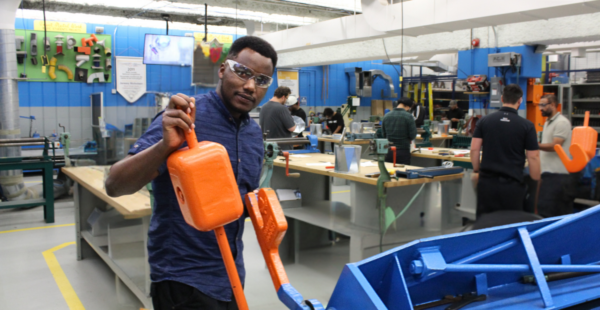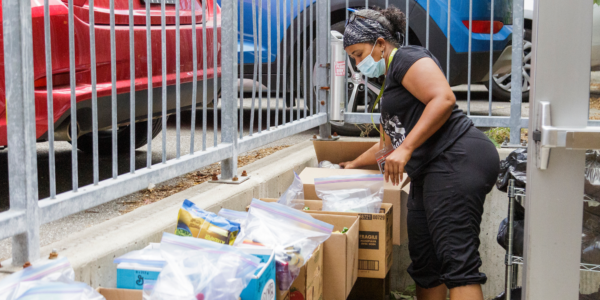Modular housing is a lot of things, but most importantly, it is a creative and viable approach to tackling Toronto’s growing housing crisis. Whether you call it modular housing, prefab construction, or factory-built homes, the process—and the goal—is the same: create more housing options, faster and less expensive. And it can’t come soon enough.
Why Modular Housing Matters Now
Right now, for every 10,000 Torontonians, 34 are homeless.
There are another 92,965 people on the city’s waiting list for social housing.
To address this acute housing shortage, Ontario’s housing action plan includes a Modular Housing Initiative that promises 1,000 new modular homes in Ontario.
So what exactly is modular housing?
Understanding Modular Housing
Modular refers to how the housing is built, not how it is used.
Modular housing is made up of pre-built smaller sections—called modules—that are constructed in a factory off-site. These sections are then transported and connected on-site to form almost any kind of building: houses, apartment complexes, schools, condos, or office buildings.
Think of it like having everyone in a group build a room for a Lego house, and then everyone puts them all together to form a big Lego house at the end.
RELATED STORIES:
The Advantages of Modular Housing
FASTER
Most North American construction projects are delivered late and over budget.
A recent study found:
- 75% of building projects cost more than planned
- 77% did not finish on time
Traditional construction means all materials must be delivered on-site in multiple trips, and tradespeople must come in the correct sequence, causing delays if even one trade is held up.
Modular construction negates many of these issues:
- Identical modules can be built simultaneously in a controlled indoor environment
- Site preparation and module construction can happen at the same time (called parallel work)
- Work can continue around the clock, not just during daylight
Modular construction can be completed 20% to 50% faster than a traditional build.
Example:
WoodGreen partnered with the City of Toronto to build a three-storey modular housing residence at 540 Cedarvale Ave for seniors who are homeless or at risk of becoming homeless.
- 59 studio apartments
- Built in just 12 months
- A traditional build would have taken 18–24 months
MORE AFFORDABLE
Modular housing also saves 20% on construction costs:
- Lower labour costs due to indoor, streamlined production
- No weather-related delays (rain, snow, heat)
- No material theft or vandalism due to indoor storage, reducing materials and security costs
MORE ACCURATE
Factory-controlled settings allow:
- Precision instrumentation
- Improved quality control
- More accurate estimation of material costs
- Less waste, making the process cheaper and more environmentally responsible
LESS DISRUPTIVE
Traditional builds in Toronto take up to two years.
(The whole process—including approvals—can take nearly 3.5 years.) Modular housing is mostly built off-site, which:
- Minimizes noise and disruption
- Reduces traffic issues
- Allows for quicker final assembly
SUSTAINABLE
Modular housing supports a more sustainable approach:
- Better insulation and precision = more energy-efficient homes
- 46% less waste
- 22% fewer carbon emissions, thanks to shorter construction times and controlled environments
SAFER
Construction is one of the most dangerous jobs in Canada:
- 35,000 construction workers were injured in falls last year
- Nearly 900 fatalities
With 80% of the work done indoors in modular construction:
- Fewer hazards from height, weather, or debris
- Safer conditions for workers
Modular Housing in Action: WoodGreen’s Commitment
WoodGreen is responding to the urgent need for affordable and supportive housing in Toronto.
OUR GOALS
- Reach 3,000 housing units by 2027
- Reach 5,000 units by 2030
Modular housing is helping us achieve these goals faster, cheaper, more sustainably, and with less disruption.
Taking on these rapid-housing projects means WoodGreen now owns and/or operates 1,741 units, steadily progressing toward our 5,000-unit goal.

Not a trend, but transformational
Modular housing isn’t just a construction trend—it’s a transformational solution to one of the city’s most pressing problems. With its speed, affordability, sustainability, and safety, modular construction is helping WoodGreen and the City of Toronto respond to the housing crisis with urgency and innovation.
WOODGREEN IN THE NEWS:
- Toronto non-profit to build affordable housing for seniors with help of $4M donation | CBC News
- WoodGreen keeps adding inventory in pursuit of 2030 housing goals






